#about the name variations and telephone game in FMA
Text
Some Incomplete Ramblings on “Liza / Riza Hawkeye”
One thing I’ve always found fascinating about FMA character / location names is that it’s like a game of telephone from European languages --> Japanese --> (in my case) English. As is such, with telephone, information has the potential to get distorted.
I own lots of FMA guidebooks in English and Japanese, and frequently entertain myself with the name variations. Liore / Leole / Reole / etc. is one of the most entertaining spelling conundrums, official sources constantly varying the name, and never honing in on a consensus over the many years’ passings. But while I could yab on about Martel and Ling and Dolcetto and Kimblee and many other names, I’m here to smile about Riza Hawkeye.
Official sources in English and Japanese almost exclusively spell her name as “Riza Hawkeye.” Over and over, it’s Riza Hawkeye. Compared to many characters, her name’s very consistent. But in some of the earliest materials from the franchise, she’s sometimes labeled as “Liza Hawkeye.” For instance, there’s an early Bandai figure with that name - a figure that would have been developed (and its label created) through Japan.
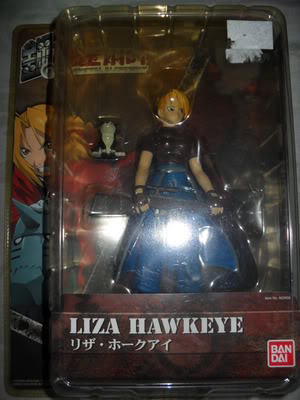
The English version of the Fullmetal Alchemist Trading Card game sometimes calls her Liza, too. Because I’m a linguist who (as my career probably implies) loves Little Language Things... I had to nab a few FMA trading cards with that variant name! I don’t collect cards, but these were irresistible! These cards came in my mail yesterday!!! Tadaaaa!
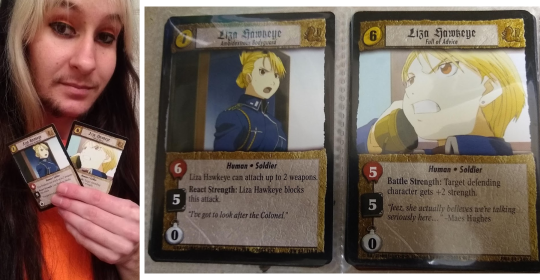
It’s hard to see in the photograph, but these cards are copyright 2005. I’ve tried to find more information on when in 2005 they were printed (no success yet), but the date 2005 is interesting. This isn’t long after the first anime’s English dub began premiering in the USA starting November 2004.
These cards may also have preceded the first official English manga publications. The manga received two official printings in English, one by Viz Media in the USA and one by Chuang Yi in Singapore. Viz Media published Vol. 1′s First Edition in May 2005; Chuang Yi was November 2005. I doubt there’d be any coordination between different companies in different parts of the world creating cards and manga and anime. Different name interpretations were far more likely to happen with FMA being turned into English for the first times. There was no established precedent for how-to-spell-what. As everyone in 2005 was working through their stuff independently or semi-independently, they were giving our girl a different first name.
Now, Riza’s name had been published in the Roman alphabet as “Riza Hawkeye” earlier than when my cards came out. The Japanese company Bandai (that gave us the Liza Hawkeye figure)... also gave us a 2003 card calling her “Riza Hawkeye.” That is, within the same company within a short amount of time, they printed two different spellings of a character’s name. There’s another card set, from 2004, that lists her as “Riza Hawkeye” as well.
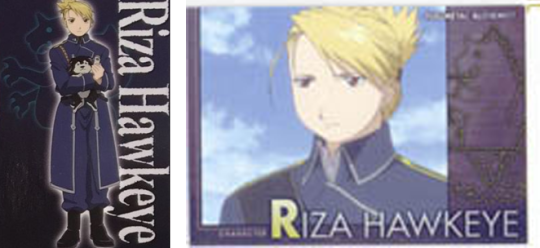
After FMA’s nascent years, Hawkeye’s Roman-spelled name quickly became solidified as “Riza.” Almost all “Liza” materials I’ve seen are 2005 or earlier. The latest material I’ve seen listed as “Liza” is a card with a copyright of 2007.

The English release of the two most important FMA franchise materials - the manga and the anime - would have solidified Hawkeye’s first name as “Riza.” On September 17, 2005, Riza’s full name was stated on screen for the first time in the English airdate... as “First Lieutenant Riza Hawkeye.” This was in Ep. 27 “Teacher.”
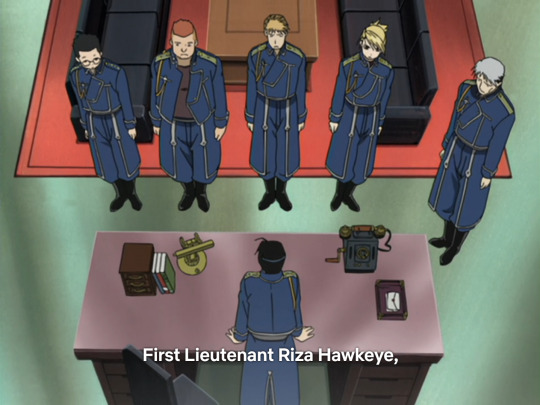
Viz Media worked alongside all this. Viz Media published both the English anime book materials (like Fullmetal Alchemist Anime Profiles, printed in English in 2006) and the manga itself. I believe the first time Riza’s first name was given in the manga was Chapter 24, when Riza introduced herself to Winry. Viz Media printed Vol. 6 (which contains Ch. 24) in February 2006. By this point, for English-speaking fans (especially in the Western Hemisphere), all major FMA materials would have called her “Riza.”
I imagine that by then, that now-iconic name would have been foolish to change. One of the most popular characters was branded firmly as “Riza” by the start of 2006. Couldn’t change that now. Unlike the earliest merchandise, now everything about Riza - both English and Japanese materials - called her Riza. All my Japanese guidebooks that never got English translations call her “Riza.” (And these are guidebooks that continue to have Roman alphabet spelling variations between other characters - even when all published in the same year). None variation left beef for Riza. I want to buy the Perfect Guidebooks, which are older than all the guidebooks I currently own, and see what they say for her name... but for now... everything I’m holding that’s in Japanese is post-2006 and all say “Riza” when they print her name in Roman letters.
I don’t know what Arakawa intended, especially as the earliest Japanese merchandise gives us both Riza and Liza. If the earliest merchandise all said one name, we could have guessed that Arakawa gave the approval. But that’s not the case. The names vary in early Japanese Bandai merch. Nor can we trust major English translated sources as hints of Arakawa’s intentions. It doesn’t seem like they asked Arakawa for explanation on everyone’s intended names. Viz doesn’t provide a good representation on what Arakawa wanted, given as they messed up majorly on other names and are only correcting them NOW, in 2018 and 2019, in their Fullmetal Edition of the manga (in the trade paperbacks, they called Kyle Halling “Khayal,” spelled Kimblee’s name two different ways, wrote “Isvharlan” in Vol. 2, gave the country’s name as “Ishbal” above drawings from the manga that wrote “Ishval,” misinterpreted Xerxes as “Cselkcess,” and lots of other fun oddities...).
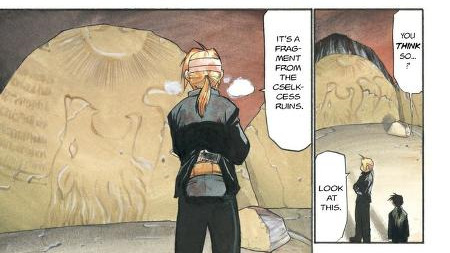
And while some names get written in English in the manga artwork proper, I’ve only seen Hawkeye’s last name.
I know far from everything. There’s still lots I have to check. Don’t take my word as law.
THAT SAID.
From the information I know... I find it fascinating it’s VERY possible Arakawa’s initial inspiration was “Liza Hawkeye.” NOT Riza. There’s in fact good linguistic reason to suppose this.
For people who aren’t familiar with Japanese typography / orthography, the Japanese writing system is composed of kanji and kana. Kanji are characters with semantic complexity to them; the kanji are usually included in a word for meaning-related reasons, but the pronunciation of the kanji can vary depending upon whether the word it contextually represents is a native Japanese word, a Chinese loan word, the first or second kanji in a compound, etc. Kana, unlike kanji, are basically read the same way every time. Instead of being symbols depicting semantic content, kana depict pronunciation content. Kana are written in a syllabary system. A syllabary is like an alphabet except that every symbol represents a syllable you pronounce (or, in Japanese, a mora). Japanese kana are two sets of syllabaries, the hiragana and katakana. Katakana is used to spell recently adopted loan words.
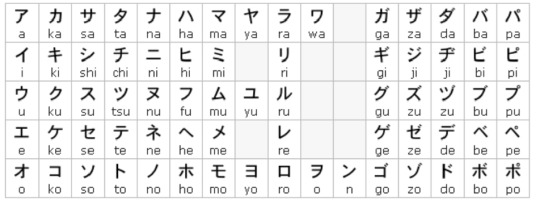
Because FMA characters’ names are (almost) all taken from European names, their names are written in katakana. But because Japanese is a different language than European languages, it has different sounds in it. This means that, when European loan words get imported into Japanese, pronunciation changes happen. The pronunciations allowed in European languages are altered into acceptable sound structures Japanese allows - its phonetics and phonology and phonotactics.
Now, Arakawa doesn’t always spell European words “typically” for katakana. Japanese has over the last few decades adopted many English loanwords. For instance, there’s a loan word for “mustang,” which is 「 ムスタング 」. Roughly, ム = mu, ス = su, タ = ta, ン = n, and グ = gu. So, the Japanese word for “mustang” is musutangu. Arakawa actually gives Colonel Mustang a different spelling than that - he’s masutangu 「 マスタング 」.
Perhaps this was because Arakawa saw the name “Mustang” in Roman letters and did her own import into kana. In the process of her changing “Mustang” from Roman letters to katakana, she might have chosen “ma” instead of “mu”. Perhaps this was because she thought this would make his name sound cooler, look unique, or make her metaphoric name more subtle. Or, perhaps this arose in foresight with the eventual “Madame Christmas” wordplay (“Christmas” in Japanese is 「 クリスマス」kurisumasu, which makes her full name kurisu masutangu - get how that works perfectly?). Whatever the reason(s), we know that Arakawa’s katakana spelling of imported European words isn’t always what Japanese’s loan word katakana spelling officially does.
Riza’s name in the Japanese could be another instance of this.
To explain what I mean, let’s take a look at my graphic:

Each line is a name in Roman letters (acceptable in English) with its corresponding Japanese spelling. In parentheses is a rough pronunciation of how that katakana’s pronounced.
First: There are indications that Riza’s full given name is Elizabeth. Some fans say it’s just her code name, akin to how “Jaqueline” is Havoc’s code name. It’s true we hear Roy call her “Elizabeth” in that code name setting. However, it’s also interesting that he calls her “Elizabeth” when he’s visiting Madame Christmas. In his home environment, where he’s dropping his walls and being far more honest and open to family, where he’s even blabbing about being romantically interested in Hawkeye OUT LOUD, he calls her “Elizabeth.” You could argue that it might be another instance of intentional code naming to protect her identity, but it’s still very interesting that this is a second, different, emotionally open, trusting context in which Roy names her “Elizabeth.”
Linguistically, her name seems derived from “Elizabeth,” too. Again: while spellings and pronunciations are slightly altered when Arakawa imports European names into Japanese, she’s still taking those names from a European source. But I don’t know of a common Western European name that’s essentially Riza. Go to baby names websites. You don’t get a long list of female names that are Riza, especially not in Western Europe, where Arakawa took most names. Where’d she get this?
A shortening of “Elizabeth” is likely.
Look at Line #1 of my graphic. I have the word “Elizabeth” in Roman letters alongside the katakana spelling of “Elizabeth.”
That first line is how “Elizabeth” is usually spelled in Japanese writing. It’s 「エリザベス」. エ = e, リ = ri, ザ = za, ベ = be, and ス = su. So the Japanese version of “Elizabeth” is more or less erizabesu. Note that the same symbol 「リ」is used for both r+i and l+i. This could be a long linguistics explanation in itself, but more or less: Japanese doesn’t have separate “r” and “l” sounds. They have one sound that’s like an “r.” But, it has pronunciation variation based upon dialect, and, within a single dialect, where said “r” is placed in relation to other sounds surrounding it. The “r” can make lots of sounds (allophones), including what English speakers would call an “l.” So when imported words from European languages which have separate r and l sounds (phonemes), these r’s and l’s get reduced in Japanese into one thing, interpreted as that single “r” sound their language has.
Now, let’s go to Line #2. A common nickname for “Elizabeth” is “Liza.” Notice the spelling. Elizabeth contains the actual, unaltered spelling of Liza. However, pronunciation changes occur. The “i” in “Elizabeth” is a different sound than the “i” in “Liza.” The spelling’s the same between full name and nickname; the first vowel just sounds different.
The Japanese katakana spelling of “Liza” is based upon the pronunciation. NOT the spelling! See my visual. The way “Liza” is spelled in Japanese is 「ライザ」- that is, raiza. ラ = ra, イ = i, and ザ = za. As a result, the name “Elizabeth” in katakana does not contain the unaltered spelling of “Liza” inside it.
Note, however, that the name **RIZA** is DIRECTLY spelled inside the Japanese spelling of “Elizabeth.” 「エリザベス」 contains 「リザ」. That is, erizabesu can be truncated to riza without any spelling changes!
That’s what we see in Line #3. Note that, in red, I have highlighted where the spellings stay the same within full name and nickname.
Ergo, “Riza” is directly derived from “Elizabeth” in the katakana spelling of “Elizabeth.” That’s indirect indication that, when Arakawa was giving Riza her name, she was looking at “Elizabeth.”
In which case, “Liza” WOULD be a correct reading for Hawkeye’s first name.
Similar to the Chris Mustang thing I mentioned, making a spelling change for an “Elizabeth” nickname makes sense in Japanese. Japanese readers might not be familiar that “Liza” is a nickname for “Elizabeth.” The fact that raiza for “Liza” is spelled very different in Japanese kana compared to erizabesu for “Elizabeth” ...would make it hard to connect the dots between the two names. But giving the spelling riza makes the connection easier-to-see: for them, in katakana, they can see riza spelled inside erizabesu. Just like, in English, we can see “Liza” directly inside “Elizabeth.”
So, from what I know, I postulate that Arakawa initially envisioned “Liza Hawkeye.” It all makes linguistic sense, and the fact that early FMA merchandise from Japan sometimes uses “Liza” only helps my case. That they sometimes also called her “Riza” is a common phenomenon of Japanese publications not knowing when to make something an R and when to make something an L. I mean, in the Death Note anime, you see someone’s name listed as “Rally” instead of “Larry.” The L/R confusion is common and appears commonly in officially released Japanese materials.
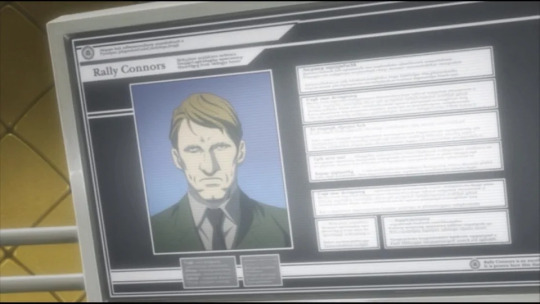
I mentioned at the start of this ramble that translating names multiple times is like a game of telephone. Thus far, it seems like we went from Liza --> リザ. Then, when North American native English speakers got the Japanese 「リザ」, they had to figure out what to do with it. Because the character’s name was spelled 「リザ」 - NOT the standard「ライザ」 Japanese use to spell “Liza” - then translators wouldn’t have thought this was an intended “Elizabeth” nickname. It doesn’t help that Roy doesn’t call Riza “Elizabeth” as code until several volumes after we’re given riza (Ch. 37 Vol. 9, I believe). So, translators were left with a really oddly spelled, indeterminate name... something that could have been spelled “Leeza” or “Reeza” or “Riza” or “Leaza” or who-knows-what. But “Liza” would have, to them, seemed like a phonetically poor choice - English readers would see “Liza” and pronounce it very differently from how the Japanese would pronounce 「リザ」. If Arakawa had intended “Liza,” she would have spelled it markedly differently, right? So “Liza” would have been an unintuitive translation option for Japanese --> English translators. On the other hand, English readers would see “Riza” and pronounce it close to how the character’s name was spelled in Japanese. So even though “Riza” isn’t a normal Western European name, that’s what seemed to make sense. Ergo, “Riza” became the “intuitive” choice for translators, and that’s what they put.
It’s not unfeasible that this “Riza” choice was made independently with several groups of people - the manga translators and the English dub script workers, namely. “Riza” seems the most default “sensible” choice. And once both Viz Media and Funimation Entertainment gave English consumers, consistently, “Riza” - well that was that! It probably influenced Japanese publishers with their next materials. It would have influenced all other English products. Thus, henceforth, Japanese or English origin, we’d only see her name as “Riza”.
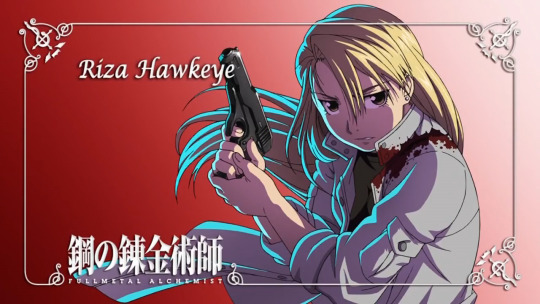
Don’t take this as a flawless or conclusive analysis. Opening the Perfect Guidebooks, after I buy them, might tweak or solidify some of my thoughts. There’s many materials, other merchandise, I haven’t seen the packaging to, or seen inside of, or know what year it was made. I might not have accurately remembered / researched the first instances in which names were given across the animes, manga, etc. I don’t know hoards about the Trading Card game. I’m not fluent in Japanese, just a beginner. I’m a linguist but academically I spent little time with Japanese in my studies and research. I definitely can’t mind read Arakawa. Other fans may know more(?). This is meant as a happy ramble of thoughts, not a conclusion. And I wrote this overnight instead of getting sleep. Because this is a wise use of time, right?
I will always call her “Riza.” The name fits her. It’s a unique name. It’s a cool name. I think it sounds better than “Liza Hawkeye.” I grew up with “Riza.” I’m attached to Riza.
But I find it so fascinating to acknowledge and study the background of when she was labeled “Liza.”
I’m quite happy to be hold cards from 2005 - in my hand - that label her such.
#long post#non-dragons#Riza Hawkeye#FMA#Fullmetal Alchemist#Fullmetal Alchemist Brotherhood#Fullmetal Alchemist: Brotherhood#FMA 2003#Fullmetal Alchemist 2003#analysis#my analysis#linguistics#close enough#I've thought about this for a while and chatted in private with irl or url friends on this#first time I'm posting some of my name variation thoughts online#I seriously#have thought#LOTS#about the name variations and telephone game in FMA#looooooooots#I love it so much it's just INTERESTING#UPDATE: I fixed a major typo#whooooops#watch the old version circulate more though hahaha that's always how it works XD
664 notes
·
View notes